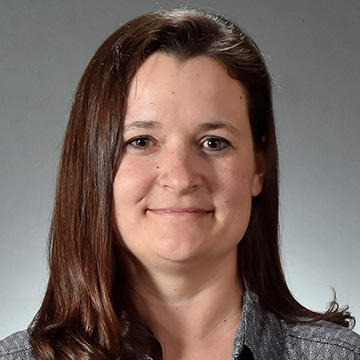
Abbie Watnik
In this installment of Senior Member Insights, OPN talks with Abbie T. Watnik—the head of the Optical Techniques Section at the U.S. Naval Research Laboratory, USA. Watnik leads programs in electro-optics, laser propagation, orbital angular momentum, lidar, speckle imaging, imaging through scattering and adaptive optics. She received her B.S. in Electrical Engineering from Colorado State University, USA, and her M.S. and Ph.D. in Optics from the University of Rochester, USA.
What first interested you in pursuing science?
After-school extracurricular science competitions in middle school and high school, such as Science Olympiad and Physics Bowl, strengthened my enthusiasm for the science I was learning in the classroom and made it fun and engaging.
What aspect of your current work do you find the most interesting or exciting?
I love seeing elegant analytical theory and simple experimental setups demonstrate imaging principals in intuitive, yet new ways.
What tips for successful networking do you have for early-career professionals?
Touch base with people during your career transitions. When I was graduating with my Ph.D., I emailed all my professional connections to tell them where I was going and sent them links to my recent papers and thesis. When I was promoted to a new position, I let my network know via email as well. Those short emails have helped me reconnect with people I haven’t talk to recently and hear about their latest accomplishments as well.
What professional resources do you rely on to stay active and engaged with your field?
To stay active and engaged in my field, I have found the most important resource is attending conferences and meeting new colleagues at meetings. Next, would be receiving short email alerts on topics I care about via: 1) OSA journal content and news articles; I receive condensed emails of the latest paper titles with links, and 2) Google Scholar citation alerts that notify me when someone has cited a paper I have written.
What’s the best career decision you’ve ever made, and why?
Going to graduate school and being mentored by an outstanding Ph.D. advisor—this completely changed the trajectory of any future career decisions and opened so many opportunities that I would not have had otherwise.
What skills do you think are most important for someone interested in a career like yours?
A strong ability to communicate your research and distill down the “why does this matter?” in very understandable ways.
What is one piece of advice that you wish you were given as a student/early in your career?
Be the best student or professional you can be; work hard and do high-quality work with integrity and honesty—but remember, there is so much more to life than just school or a career. Make sure to explore other interests, hobbies and passions as well.
What have you learned by being a mentor to others, and what have you learned from mentors who helped shepherd your career?
I have the utmost gratitude for those who have served either as formal or informal mentors and role models for me throughout my career! Those who have devoted time and energy to teaching me and those who have unselfishly advocated for my success are examples of people who I strive to be.
On the flip side, I love the enthusiasm of a mentee exploring something new for the first time; it gives me new enthusiasm for the topic and helps me see old topics through new lenses.
At this point in your career, what are you most looking forward to next?
Continuing to develop innovative and novel research programs with a talented, top-notch team of scientists and engineers.
If you weren’t in the sciences, what would be your dream career?
I have many diverse interests, so it would be hard to choose an alternative dream career … possibly a business consultant, interior home decorator and stager, or a personal financial advisor.
